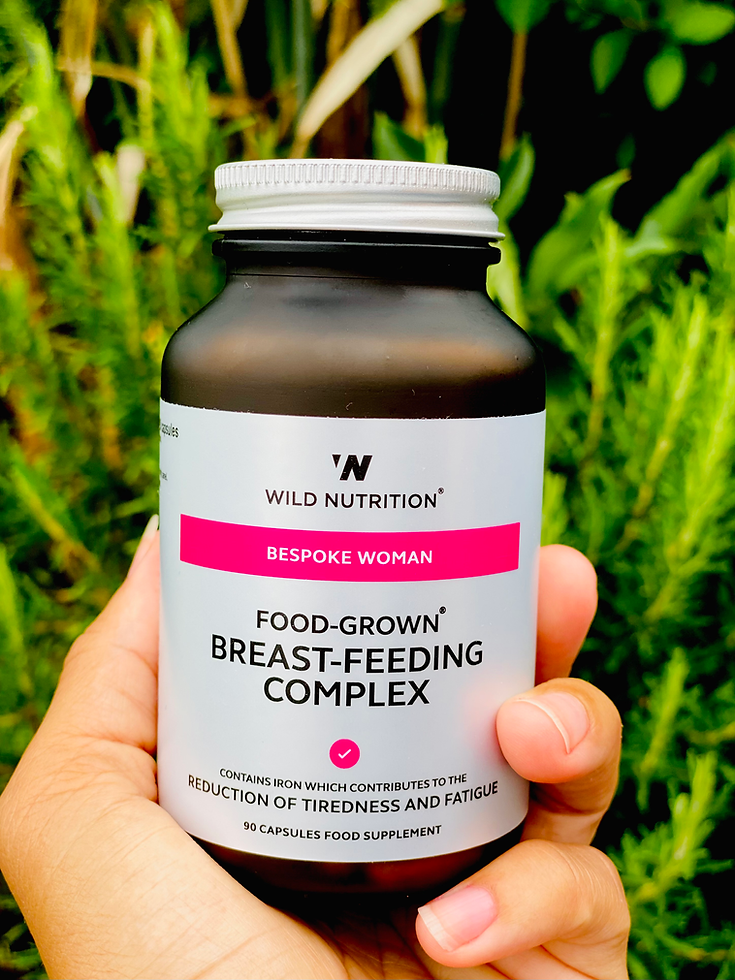
Vitamins and Minerals you Need to be Aware of whilst Breastfeeding
- Danielle Facey
- Jan 13, 2022
- 3 min read
Updated: Jul 18, 2025
If you search for dietary guidance as a nursing mama, you are likely to come across vague recommendations such as, “Eat a well-balanced diet,” and, “Be guided by your appetite.” For me this vagueness is unhelpful and problematic, as it fails to acknowledge how nursing moms require more of certain vitamins and minerals - not just because it affects the levels of these micronutrients in their milk - but because it affects their health and wellbeing too.
Having experienced the scary effects of potassium deficiency myself, I see sharing knowledge about key vitamins and minerals for nursing moms as a positive thing. No, you don’t require a specialist diet as a lactating mother and yes, your milk will nourish your little one just as well if you have had a few more takeaways than usual, but surely there is no harm in being more aware of the nutrients that we need to feel well whilst breastfeeding?
Iron
Infants are particularly susceptible to iron deficiency due to rapid rates of growth. However, iron levels in breast milk are low and do not meet infant demands for iron beyond around six months of age (Dror & Allen, 2018). As a lactating mother, iron is essential for normal production and regulation of cells and hormones. Deficiencies can lead to light-headedness and fatigue - both highly undesirable symptoms at any stage of life, but particularly whilst breastfeeding. Food sources of iron include meats, poultry and seafood, as well as nuts, seeds and vegetables (Iron, 2020).
Folate (Folic Acid)
As essential when you are lactating as it was when you were pregnant, folate plays a key role in cell growth and building DNA. Whilst deficiencies are rare, symptoms include weakness, fatigue and an irregular heartbeat. Food sources include dark green leafy vegetables, beans, whole grains and eggs (Folate (Folic Acid) – Vitamin B9, 2019).
Vitamin C
Essential for immunological function and healing, vitamin C levels fluctuate in your milk in accordance with levels in your diet (Dror & Allen, 2018). The need for vitamin C is greater in lactating women than it is in pregnancy. Common food sources include fruits and vegetables - particularly citrus fruits and cruciferous vegetables such as broccoli, cauliflower and cabbage (Vitamin C, 2021).
Vitamin D
Associated with bone health and immune function, it is crucial for developing babies. It is readily produced by our bodies when we expose our skin to the sun but deficiencies re common in industrialised populations where indoor living in commonplace. There are few food sources which naturally contain vitamin D and so it is best taken by supplementation and by eating fortified foods such as grains, juices and dairy products (Vitamin D, 2021, Dror & Allen, 2018).
Potassium
Vital for the normal functioning of all cells, potassium regulates the heartbeat and ensures proper function of the muscles and nerves (The Importance of Potassium, 2019). As mentioned in tip five (of the book), potassium deficiency can be serious and is more likely in nursing women due to the increased loss of fluids through lactation (Strohm et al. 2017). Bananas are well-known for being a good source of potassium, but other fruits like apricots, prunes, and oranges as well as vegetables such as squash and potatoes are also excellent sources of this mineral (The Importance of Potassium, 2019).
Taking care of yourself as a nursing mama means taking care of your babe(s) too, so instead of only munching your toddler’s scraps at mealtimes,be sure to give yourself the nourishment that you deserve too. It is easier said than done to ensure that you are eating a well-balanced, healthy diet as a busy mama and so I always recommend that nursing mothers take a breastfeeding multivitamin. My personal choice is Wild Nutrition’s food Grown Breastfeeding Complex. I love that the ingredients are from 100% food grown sources, so there are no hidden addictives or preservatives. Highly recommended. Get 25% off yours as well as the entire Wild Nutrition range using discount code DANIELLE25 at: https://www.wildnutrition.com
Adapted from ‘The Breastfeeding Survival Guide’ - available to read for FREE on Amazon Kindle and to purchase, here: www.thebreastfeedingmentor.com/book
References:
Dror, D. K., & Allen, L. H. (2018). Human Milk Composition: Nutrients and Bioactive Factors. Advances in Nutrition, 9(1). https://doi.org/10.1093/advances/nmy022
Folate (Folic Acid) – Vitamin B9. (2019, July 2). The Nutrition Source. Retrieved August 11, 2021, from https://www.hsph.harvard.edu/nutritionsource/folic-acid/
Harvard Health. (2019, July 18). The importance of potassium. Retrieved 30 September 2021, from https://www.health.harvard.edu/staying-healthy/the-importance-of-potassium
Iron. (2020, October 19). The Nutrition Source. Retrieved August 1, 2021, from https://www.hsph.harvard.edu/nutritionsource/iron/
Vitamin C. (2021, May 27). The Nutrition Source. Retrieved December 3, 2021, from https://www.hsph.harvard.edu/nutritionsource/vitamin-c/
Vitamin D. (2021, March 3). The Nutrition Source. Retrieved August 1, 2021, from https://www.hsph.harvard.edu/nutritionsource/vitamin-d/






Comments